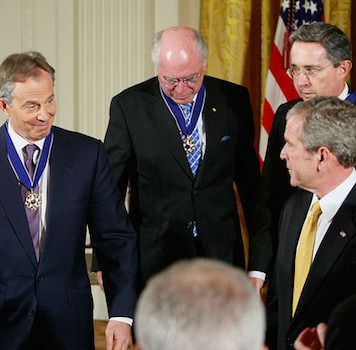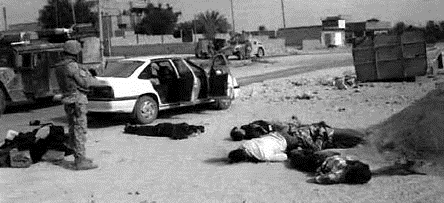After seven years, Sir John Chilcot has reported on how the United Kingdom found itself in Iraq in 2003 and what it all meant. Chilcot’s report considers the actions and words of British Prime Minister Blair, United States President George W. Bush, many other people, and even, here and there but not often, Australian Prime Minister John Howard. Honest History has collected this bundle of commentary, some from less well-known sources. We do not claim it is comprehensive.
Mainstream media
Update 31 August 2016: Mike Kelly MP, Kellie Merritt, service widow, and Paul Barratt, ex-head of Defence Department and now advocate for reform of war powers (Lateline).
Paul McGeough in Fairfax summarises Chilcot’s findings thus:
- There was no imminent threat from Saddam Hussein.
- A strategy of containment was preferable to military intervention.
- There was no justified certainty to London’s judgments on the severity of any threat imposed by Iraq’s WMD.
- Blair was warned explicitly, but chose to underestimate the consequences of the 2003 invasion.
- Planning for managing post-Saddam Iraq was inadequate.
McGeough describes Howard as ‘the patsy from Down Under, his eagerness to sign on made it possible for Bush to dress up his miscalculated need to go after Saddam Hussein in the aftermath of the 9/11 attacks, as an imposing “Coalition of the Willing”‘.
Ben Doherty and Kate Lyons in Guardian Australia focus more on reactions to the report, with former Defence secretary, Paul Barratt, and former intelligence officer, Andrew Wilkie MP, saying Australia needs a Chilcot-style inquiry, with former Chief of Army, Peter Leahy, disagreeing on that issue but saying the main point is not to go blindly into war. Retired general, Jim Molan, who commanded troops in Iraq, has ‘no regrets at all’ and is opposed to the idea of having a parliamentary debate before committing to war. (Arguments for such a debate are here.)
Counter-insurgency expert, David Kilcullen, writes about the report in The Australian, noting the important difference between the legality of a war and its strategic wisdom. Peter Jennings of the Australian Strategic Policy Institute, also in The Australian, believes Chilcot is naive about how countries go to war.
At these times the overwhelming experience of senior decision-makers is about the lack of clarity, inaccurate intelligence, the need to make speedy judgments with poor information, inadequate preparation, insufficient resources and no clear idea of how to deliver outcomes or really what the outcomes should be.
Non-mainstream media and blogs
Updated 22 November 2016: VG Venturini has a series in Australian Independent Media Network on Iraq and Chilcot.
Updated 25 July 2016: former diplomat and senior public servant, Greg Wood, says in Pearls and Irritations that Iraq was a leader-driven war and it is ‘the statements, judgements and actions of Australia’s leaders, and those of the other countries who chose to be in (or out) of the “coalition of the willing”, that warrant serious analysis, even now’. This rather than the quality of intelligence is the nub of the issue.
Updated 14 July 2016: Paul Barratt says in Pearls and Irritations that ‘John Howard’s protestations to the effect that he was led into error by faulty intelligence are difficult to sustain’; Spencer Zifcak, also in Pearls and Irritations, tackles the legal issues and says Australia should do a Chilcot inquiry; Alan Patience, Pearls and Irritations again, says ‘[s]ycophancy to the United States over-rode [John Howard’s] judgement of what was really in Australia’s national interest’. Also Rod Barton in Lowy Interpreter on the role of intelligence, the legal basis for war, other considerations before war, lessons for Australia.
Given the passage of time [says Barton], a Chilcot-type inquiry into Australia’s involvement in the Iraq War is probably not the most productive way to proceed.
Australia would most benefit now from a more general examination of the process by which the Australian government decides to commit forces to an armed conflict. If we have learned anything from Chilcot, it is that more checks and balances are required so that the mistakes that led to the Iraq War are never repeated.
___________________
Honest History’s Alison Broinowski, who was in London for the release of Chilcot’s report, asks in Independent Australia what his findings mean for Australia’s alliance with the United States. ‘Australia gets minimal attention in [the] report, and for good reason’, Broinowski says. ‘Howard unquestioningly committed Australian troops, as usual since World War II, to yet another American war. Both he and Blair behaved like George Bush’s poodles.’
What lessons were learned then?
He [Blair] and his Australian ally [Howard] evidently conspired to take the same line on invading Iraq, for John Howard too has said he would do it all again in the same circumstances. Neither of them will apologise for their errors, instead shifting the blame onto the intelligence agencies. But Chilcot shows that the intelligence the two prime ministers were given was mainly accurate and timely: it was their use of it that was selective.
Broinowski notes that we still don’t know all of what passed between the leaders, we have had no Chilcot-style probe here – and we still lack war powers reform. (A version of her article is on Pearls and Irritations. An earlier piece of hers with a link to a damning piece of evidence from a former parliamentary officer is here. A later piece from her on Pearls and Irritations is here.)
Also in Independent Australia, Sandi Keane accuses Prime Minister Howard of ‘deep dishonesty and poor judgement’. She looks closely at evidence in Howard’s memoir, Lazarus Rising. Howard himself appeared on Lateline (includes transcript). He also gave a press conference (no transcript).
 President Bush presents medals to PMs Blair and Howard (Independent Australia/Zimbio)
President Bush presents medals to PMs Blair and Howard (Independent Australia/Zimbio)
Judy Betts in Inside Story looks at how the Iraq War was filtered through media management by government.
From the early preparations for war through to the post-invasion excuse-making, George W. Bush, Blair and John Howard kept strictly to script. The reasons for going to war – principally the threat of a WMD-armed Saddam – were carefully coordinated in terms of timing and content. In the war’s aftermath, there have been no admissions of guilt or wrong-doing …
A 2003 parliamentary inquiry in Australia came to similar conclusions to those now reached by Chilcot but Betts suggests that report was handled in a way calculated to encourage the media to defuse its findings.
Both Howard and Blair have accepted responsibility for their decisions to go to war but blamed flawed intelligence. In Howard’s case, his claim does not square with the advice of his own intelligence community, which failed to find a compelling case for the invasion.
Honest History has a collection of material on how wars have been reported in Australia, including the role played by the Defence bureaucracy; Betts’ work suggests further layers of confusion and obfuscation have existed and need to be explored.
Then there is an extract in The Conversation from James Brown’s Quarterly Essay, Firing Line, which focuses on the importance of generating public trust in decisions to go to war. Finally, there are a number of pieces in John Menadue’s blog Pearls and Irritations (John Menadue is a former senior public servant and diplomat and one of Honest History’s distinguished supporters):
- former journalist, John Tulloh, recalls Australian Defence Department attempts at media manipulation around the time of the beginning of the Iraq War;
- a 2014 article from John Menadue on media manipulation by the Murdoch press in relation to Iraq;
- a link to some 2005 material from Robert Manne on the same subject (Robert Manne is one of Honest History’s distinguished supporters);
- a long article from Richard Butler, former senior diplomat and senior weapons inspector in Iraq, who is pleased that the Chilcot report is by no means a whitewash (Butler’s concluding paragraphs are below);
- Douglas Newton, author of Hell-Bent and another of Honest History’s distinguished supporters, on the need for war powers reform (again, an extract is below); and
- former senior diplomat, Garry Woodard, who looks forward to researchers poring through the Chilcot documentation (again, extracts below).
Key paragraphs
Richard Butler
Not only have our main political parties become thoroughly convinced that there is no appetite in the electorate for our asserting independence in foreign policy, but there seems to have been a growing acceptance that on military intervention overseas, we have a Presidential system, where the Prime Minister decides and may or not consult his colleagues, let alone the Parliament. As is pointed out by Australians for War Powers Reform (www.warpowersreform.org.au), urgent action is needed to clarify the practice under which Australia decides to go to war and such a decision is authorised in a way which is consistent with our constitution and democracy …
In listening to Sir John Chilcot and Tony Blair, at this significant moment, it seemed to me that another abiding principle was illuminated: that whatever is done must be done for the right reasons. This may not guarantee success, but the absence of the right reasons will surely guarantee failure.
Douglas Newton
The Chilcot report should prompt much heart-searching, and not only about Australia’s commitment to the Iraq War in 2003. It should prompt us to think about two long-standing problems: the use of the “war powers” by the Executive, without any requirement to consult parliament; and the broader issue of balancing Australia’s interests in her alliance relationships. In essence, two questions should haunt us. First, should our decision to go to war be made by handfuls of people at the centre of power? Second, do we as a people so crave the approval of powerful allies that we should plunge our military forces into faraway deployments without carefully weighing costs and objectives?
Garry Woodard
I have described Howard on the evidence as a signed up member of the war party from the start, in the cauldron of Washington on 9/11 and in the heady air of Air Force Two flying out of Washington. He wanted to show solidarity with Bush and with his country, then seen as an unassailable megapower going from strength to strength economically in the age of globalisation and militarily because of the revolution in military affairs (RMA) …
A serious country would do what Britain has done, hold an enquiry and draw lessons from Chilcot now, notably that decisions on going to war should no longer be made by one man, that there must be collective Ministerial discussion, bringing in officials, which encourages frank and informed debate and challenge, and that the alliance with the United States does not require unconditional support and can bear honest disagreements.
 Civilian casualties, Haditha, Iraq, 2005 (Wikimedia Commons/Washington Post)
Civilian casualties, Haditha, Iraq, 2005 (Wikimedia Commons/Washington Post)
9 July 2016 and updated



Leave a Reply
You must be logged in to post a comment.